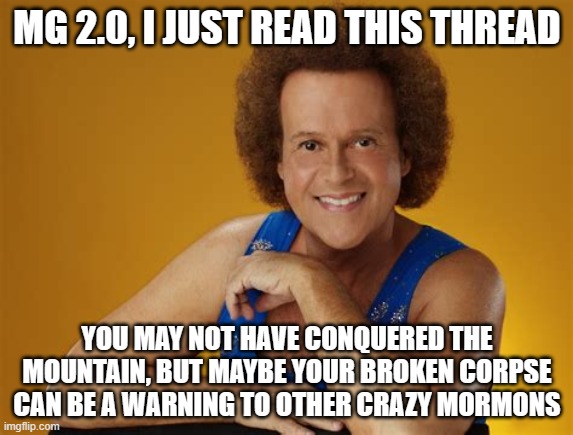This will be ignored.Rivendale wrote: ↑Fri Nov 03, 2023 7:33 pmDavid Bokovoy addresses the apologetics here.MG 2.0 wrote: ↑Fri Nov 03, 2023 6:31 pmI am not an authority Deutero-Isaiah but here is an apologetic source for outside observers of this thread:
https://www.fairlatterdaysaints.org/arc ... -of-Mormon
It seems as though this is an unsettled question along with others.
But the fact remains, however one chooses to skirt around it, that it would have been very unlikely for Joseph Smith to have written the Book of Mormon on his own.
I again refer readers to this essay:
https://journal.interpreterfoundation.o ... y-sources/
A long read, but worth it.
Of course if you’re of the same mind as Dr. Steuss and make a mockery of the whole thing by throwing out:
Then what Brian Hales or anyone else has to say in regards to the veracity of the traditional narrative of the Book of Mormon is going to be the ramblings of a deluded crackpot.
Regards,
MG
Eta. I will take Dr. Bokovoy's account over Hales or fairmormon neither of which have exposure to critical research of Isaiah.Without the biblical book of Isaiah, the Book of Mormon would not exist. Isaiah appears directly cited, echoed, or alluded to throughout the entire work. For many years, Mormon apologists have struggled to reconcile their belief in the book as an authentic work from antiquity with the fact that the Book of Mormon relies so heavily upon the exilic chapters of Isaiah, which the Book of Mormon anachronistically presents as pre-exilic material. This underlying assumption reflects Joseph Smith’s own early nineteenth century beliefs regarding Isaianic authorship. However, Smith's understanding, and by extension, the one featured in the Book of Mormon, is not a reflection of historical reality.
Simply put, if the Book of Mormon is what most Latter-day Saints assume, namely an authentic ancient translation of a historical record from antiquity, then the Isaianic material scholars refer to as Deutero-Isaiah should not appear cited throughout the work. Yet it does, extensively.
Apologists addressing this issue have frequently noted that not withstanding this serious challenge to their beliefs, at least the Book of Mormon never presents the final ten chapters of Isaiah as pre-exilic material. And this is significant.
Since 1892, biblical scholars have recognized that Isaiah 56-66 contain an anthology of approximately twelve passages of oracles written by unknown prophets in the years immediately following the Jewish return from Babylon. If this post-exilic material appeared in the Book of Mormon, it would prove detrimental to traditional claims that the book is an ancient record.
Unfortunately, Mormon apologists who attempted to address these issues have had very little exposure to critical research on Isaiah. In reality, the Book of Mormon relies heavily upon what scholars refer to as Trito-Isaiah. Not only are these post-exilic chapters sometimes cited and alluded to throughout the book, the editors responsible for this final addition to the Isaianic corpus shaped the material the Book of Mormon cites as authentic pre-exilic Isaianic prophecies.
Without the book of Isaiah, the Book of Mormon would not exist. And its extensive reliance upon the post-exilic shaping of Isaiah helps scholars establish the Book of Mormon’s nineteenth century origins, and therefore, the original context or historical Sitz im Leben by which the book should be interpreted.
Or in other words, after an extended break of serious soul searching, I feel it's high time for me to return to my passion for critical scholarship and the way it helps contextualize religious texts. Because there is a lot to say about this exciting topic that helps us to better understand the Book of Mormon.
Colby Townsend and I are in the process of co-authoring an article on the subject. Whereas my own studies have primarily focused upon Deutero-Isaiah in the Book of Mormon, Colby has done extensive research on Trito-Isaiah that has significantly enhanced my understanding of the issue.
- Doc
